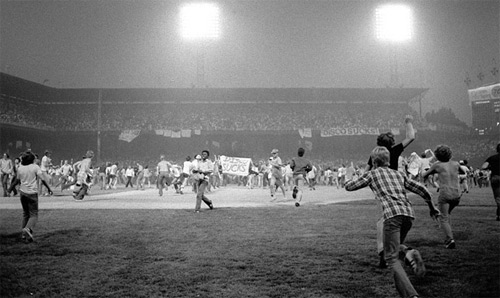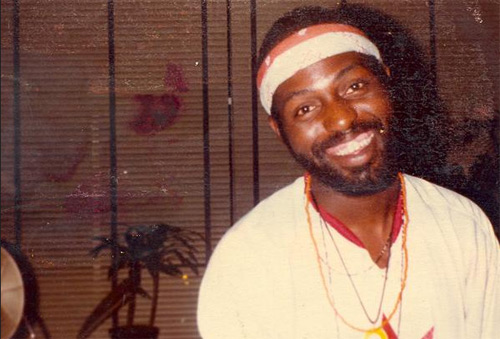Ahead of the release of his latest mix album, Dimitri From Paris In The House of Disco, the musical connoisseur muses on the ever-evolving relationship between Disco and House, beginning with an infamous incident that took place in Chicago towards the end of the 1970s.
On July 12th 1979 fifty thousand people gathered in a Chicago baseball stadium to blow up Disco records between games. This was the climax of the "Disco Sucks" campaign, created by people who didn't like what had become the most popular sound of the time. Or maybe it was the fact that Disco was deeply connected with the gay community, and predominantly the work of afro-americans.
The backlash against Disco was unsurprising since it had grown massively in popularity with radio stations up and down the country converting to an "all Disco" format, saturating the airwaves with an increasingly cheesy sound as more and more major artists, from Rod Stewart to Ethel Merman, jumped on the Disco bandwagon. "Disco Demolition" and the controversy it generated were highly mediatized, and added to the bad name Disco already had, accelerating its fall from mainstream ubiquity.

In the same city, in a club called the Warehouse, where bonafide R&B and Disco were the main ingredients, a DJ named Frankie Knuckles was looking at ways to preserve and evolve the sound he and his predominantly black and latino, gay crowd cherished. As the stream of American Disco releases was drying out, Frankie began mixing in the more synthesized sounds from Europe and creating his own edits of Warehouse Disco classics, in order to refresh them and extend their lease of life. Technology was used as a necessity to revitalize the lush sound of R&B based Disco that was disappearing. An electronic drum machine was added to the mix, creating a unique sound, soon referred to as Warehouse music. In 1982, having sewn the first seeds, Frankie left the Warehouse to open his own club, allowing DJ Ron Hardy and other luminaries to add to what was by then acknowledged as the "House Sound of Chicago." In just a few short years, Disco had gone from the mainstream to the underground, mutating on its way by necessity, technology, preservation and creativity.
Gone though were the big major label budgets, the forty piece orchestras, the huge recording studios. House music was in the hands of a few DJs and music lovers, mostly in Chicago, armed with nothing more than their love of Disco and any piece of music gear they could afford get their hands on. Their attempts to recreate the music they grew up to love through the circuits of a few cheap drum machines and synthesizers may have sounded, for better and worse, crude and sparse in comparison. But they unwittingly created a new soundscape, one with a relentless electronic energy, an unlikely combination yet unheard of.
By 1985 the first wave of all electronic black music - "House" music - took the UK, then the world, by storm.
Many like me were only exposed to the top of the Disco iceberg, which was mostly commercial pop with an added beat, cashing in on Disco's success. I didn't know much of the R&B and Soulful side of Disco until I discovered House which in turn made me look at where it came from. I found out that House was the love child of Disco. But a bastard child. It almost felt like its creators refused to give it the Disco name for its own protection, a name that had an ill fated destiny.
Over the course of nearly twenty years House music evolved from its low key amateur foundations to occupy the same mainstream position that Disco was in thirty years ago. While some gave in to a business ethos, others kept their underground credibility and aesthetics. Despite it being clear to me that Disco was House music's backbone all along it remained a dirty word, typically referring to the worst end of its spectrum. But through time, being the not-so-secret love of many a House music head, including yours truly, Disco was slowly but surely making its way back. 2014 finally saw proper acknowledgment of the original R&B Disco, in the indisputable form of awards and top chart positions by well established artists, as well as strong newcomers: Daft Punk, Robin Thicke, Breakbot, Skream to name a few.
This new compilation is a testament to how Disco and House are intertwined three decades after their inception. Rather than focusing solely on classic original recordings, I wanted to show how those sounds were made contemporary without losing their spirit. .
You will find here a collection of a few originals, most updated, as well as current renditions of the classic sound of Disco and House. You will hear how a fresh generation of artists is finally and unabashedly recording new, sample free, Disco Music, and how the electronic House sound of its origins is making a stylistic return: a sound I would call neo-vintage, that embraces the foundation of current Dance Music, celebrating its culture and history and making it contemporary in the process.
I would like to dedicate this collection to the recently deceased Godfather Of House, Frankie Knuckles. A key person in the mutation of Disco into House, he best described House music as "Disco's Revenge."

And a very sweet one it is.
Dimitri From Paris, 2014
Dimitri From Paris In The House of Disco is out 15 June (2CD and digital) on Defected Records - order on iTunes and Amazon
Dimitri plays the Glitterbox Opening Party at Booom Ibiza, Saturday 07 June - click for full details



